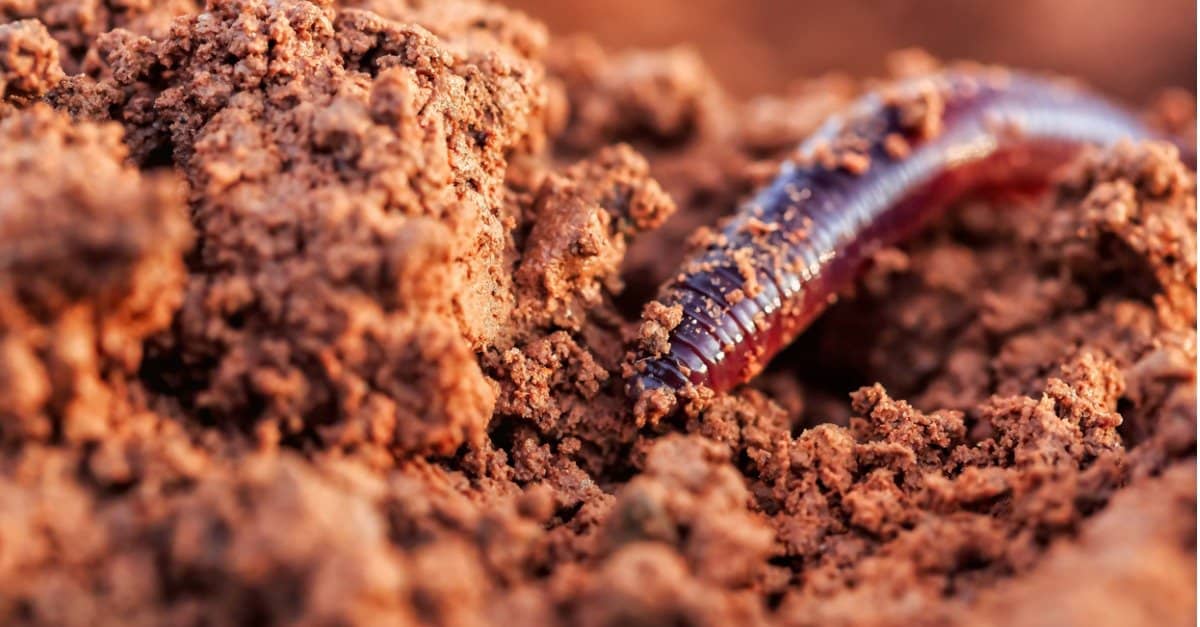Have you ever taken a bag of trash out to the trash can, only to discover a pile of wriggling worms at the bottom of the can? Chances are, this has happened to you more than once. When most people see worms crawling through the trash, their first instinct is to shudder with revulsion.
After all, seeing worms crawling over dead or decaying matter is a gruesome reminder of how we will all one day end up. It’s no wonder that worms are often called “creepy crawlies,” given their association with death.
That said, worms serve an important ecological function. They break down decaying matter, aerate and enrich the soil, and help to reduce waste. In many ways, worms are nature’s recyclers, mulching the old and creating new fertile ground wherever they go. Yet, the question remains, given their connection with death, exactly what do worms eat?
If you’ve ever stopped to wonder about the diet of worms, then you’ve come to the right place. Today, we’ll discuss what worms like to eat, and cover some of their favorite foods. We’ll also talk about how they find food, and how they go about breaking food down.
In addition, we’ll compare what worms eat in the wild versus what pet or raised worms eat. Finally, we’ll end with a discussion of what baby or juvenile worms eat.
So, with that said, let’s get crawling and dig into the subject of what do worms eat:
What Do Worms Like to Eat?
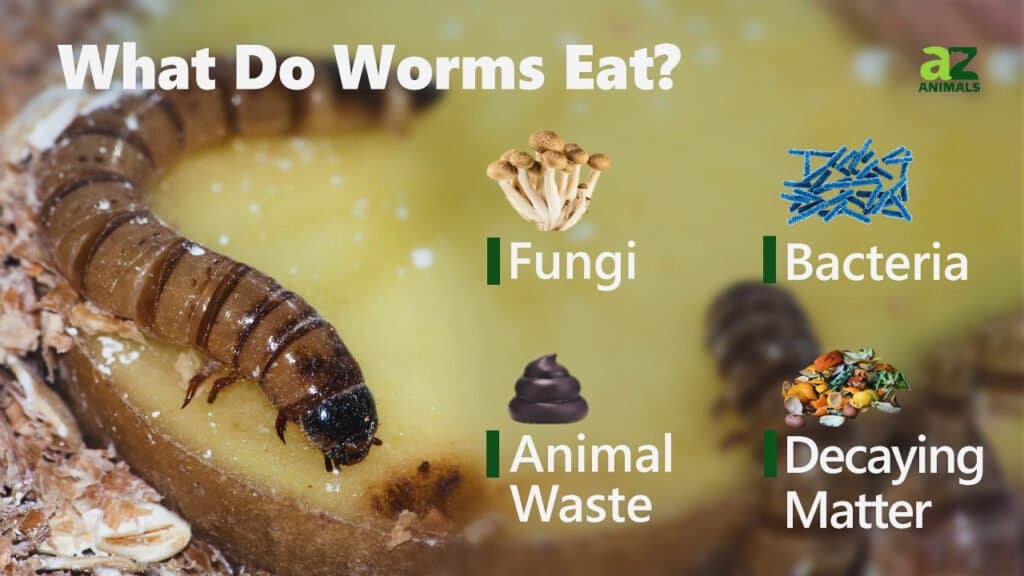
In essence, worms eat organic matter. If something is alive or was once alive, worms will eat it. They aren’t overly picky eaters and will eat just about anything that won’t put up a fight. Whether it’s dead plant or animal matter, eventually everything becomes worm food.
Old fruits and vegetables, decaying plants, food waste, dead animals, and even feces are on the menu for a worm. That said, worms do find certain foods repellant, and may avoid particularly odious, pungent, or toxic foods.
The reason for this is that worms are extremely sensitive to the substances in their environment. Worms breathe through their skin and are drawn to certain tastes and chemicals in the soil around them. Anyone who has ever composted before will notice that worms are drawn to particular foods. We’ve compiled a list of ten foods that worms particularly enjoy.
What do worms eat? These foods include:
- Vegetables
- Fruits
- Paper
- Decaying plant and animal matter
- Bacteria
- Fungi
- Animal waste
- Eggshells
- Microorganisms
- Coffee beans
How Do Worms Find and Break Down Food?
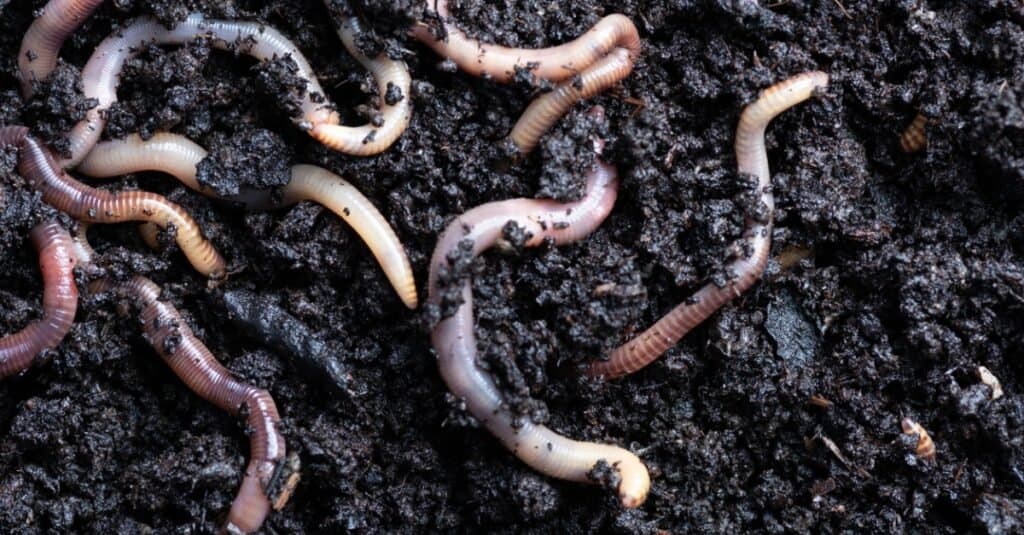
Earthworms’ bodies are covered in chemoreceptors which help them to locate food.
©iStock.com/Steve Jones
Worms are relatively simple creatures. While they possess a brain, their nervous system is not as complex as that of humans or even other animals. As a result, worms do not have eyes, ears, or noses, and therefore sense and interact with the world in a very different way. That said, it would be incorrect to say that they can’t see, hear, or smell things. It’s just that they go about doing so in a novel way.
Although they don’t have eyes, worms do possess light receptors, allowing them to differentiate between light and dark. Rather than hearing with ears, they can sense vibrations in the ground. Even though they can’t smell, worms can still taste to detect food particles in the soil around them. Their bodies are covered in chemoreceptors, which enable them to hone in on chemicals in their vicinity.
Worms move by expanding and contracting the muscles that run the length of their body. In this manner, they literally inch along through the ground and above the soil. Additionally, tiny hairs cover their bodies, which allow them to grip onto the soil and other objects. Once worms find food, they will set about consuming it with gusto.
Worms don’t have teeth, which means they must rely on other methods to break down food. Instead, they guide food into their mouth using a liplike protrusion. Once inside, food is then coated in saliva and pushed down the throat into the crop, before moving onto the gizzard. Inside the gizzard, food is broken down by digestive enzymes and even small stones that worms ingest.
Anything not passed into the bloodstream or broken-down is then expelled as waste.
What Do Worms Eat in the Wild?
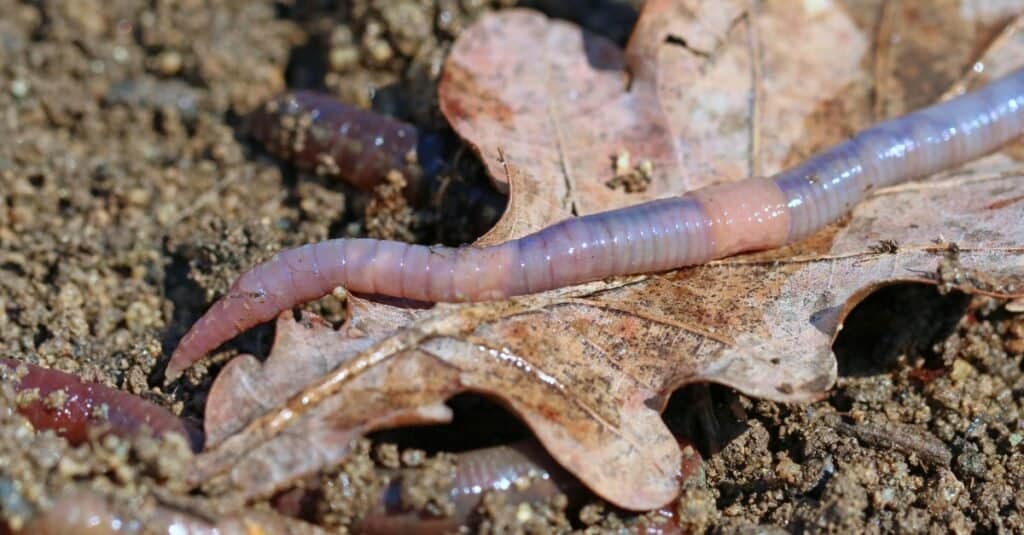
Earthworms eat decaying plant matter as well as microorganisms like nematodes and protozoans.
©iStock.com/Andreas Häuslbetz
So, what do worms eat? Worms are omnivorous, meaning they eat both plant and animal matter. In the wild, worms eat just about any sort of decaying plant or animal matter that they can find. Worms living in forests will consume decaying leaves, roots, or trees, which helps to enrich the soil.
They will also consume rotting fruits and vegetables, as well as cereals and grains. If it was once living, worms likely eat it. Meanwhile, worms that encounter carrion or dead animals will proceed to break down meat, bones, and any other organic matter.
Additionally, worms will also eat fungi, as well as bacteria and other small microorganisms that live in the soil. Common microorganisms that worms eat include nematodes, rotifers, and protozoans. They also will eat animal waste such as feces, which helps to break down and recycle these waste products.
What Do Pet Worms Eat?
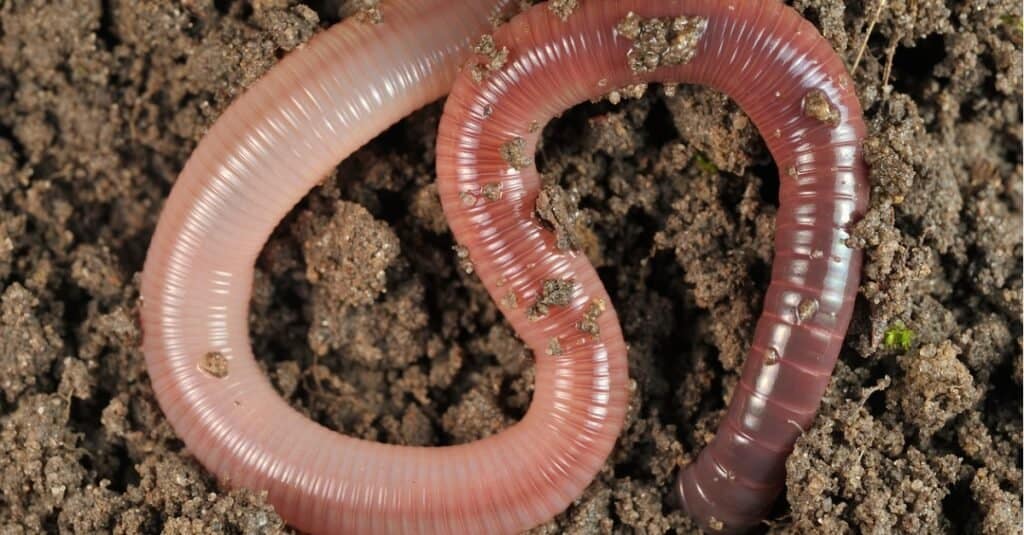
Avoid feeding pet worms oily or greasy food, citrus fruits, or foods full of preservatives and pesticides.
©D. Kucharski K. Kucharska/Shutterstock.com
Many people raise worms to help with composting or to sell as bait to anglers. If you decide to raise worms, there are a few things you should know. Suitable foods that worms can eat include vegetable and fruit waste, eggshells, coffee grounds, paper, and decaying plant matter. These foods are easily digestible, and will not create too much mess in a compost bin.
In particular, worms love to eat foods like pumpkin, squash, and melon, because they’re full of sugar and break down easily. Some people that raise worms will buy specially formulated “worm food” that includes things like cornmeal, chicken mash, kelp meal, alfalfa, and other vegetable castoffs. If you feed your pet worms coffee, make sure to not give worms unused coffee grounds, or coffee liquid, as these are too acidic. You can also feed worms high-quality manures, such as horse manure.
However, there are certain foods that you should avoid feeding pet worms. These foods are either too acidic or toxic, too messy, or simply not high on a worm’s list of favorite foods. For example, you should avoid feeding worms greasy or oily foods or foods with preservatives.
Red meat bones and fat, while part of a worm’s diet, are also quite smelly, and shouldn’t go in a compost bin. Avoid giving worms yard waste that’s treated with pesticides, as it can be toxic.
Also do not put human or pet waste in your compost bin, as the feces may contain harmful substances for worms. Additionally, worms do not like to eat citrus fruit, and they’ll avoid fruits that are overly acidic. This includes fruits like lemons, limes, oranges, and grapefruit. Finally, worms may avoid overly pungent foods such as garlic and onion, so it’s best to avoid these.
What Do Baby Worms Eat?
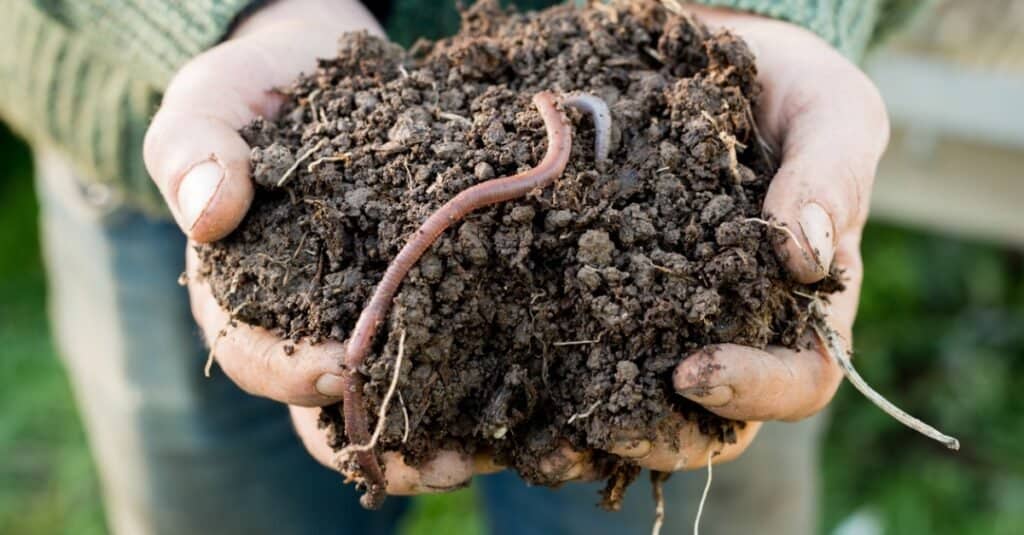
Baby worms can fend for themselves immediately after being born.
©iStock.com/PhotographyFirm
Worms are hermaphrodites, meaning that they grow both male and female sex organs. That said, they do not mate alone, and reproduction requires two worms to copulate together. The larger the worm, the more times it will reproduce and the more offspring it will create. Each worm cocoon can contain multiple eggs, which usually incubate for several weeks to several months.
Upon hatching, baby worms will immediately set out in search of food. They do not need their parents to take care of them and are completely self-sufficient. Many worms can eat up to half their body weight in a single day. After 2 to 3 months, they will reach sexual maturity, and be able to reproduce and make more worms.
Worms can live for up to four to five years, making them surprisingly long-lasting and durable.
Thank you for reading! Have some feedback for us? Contact the AZ Animals editorial team.

